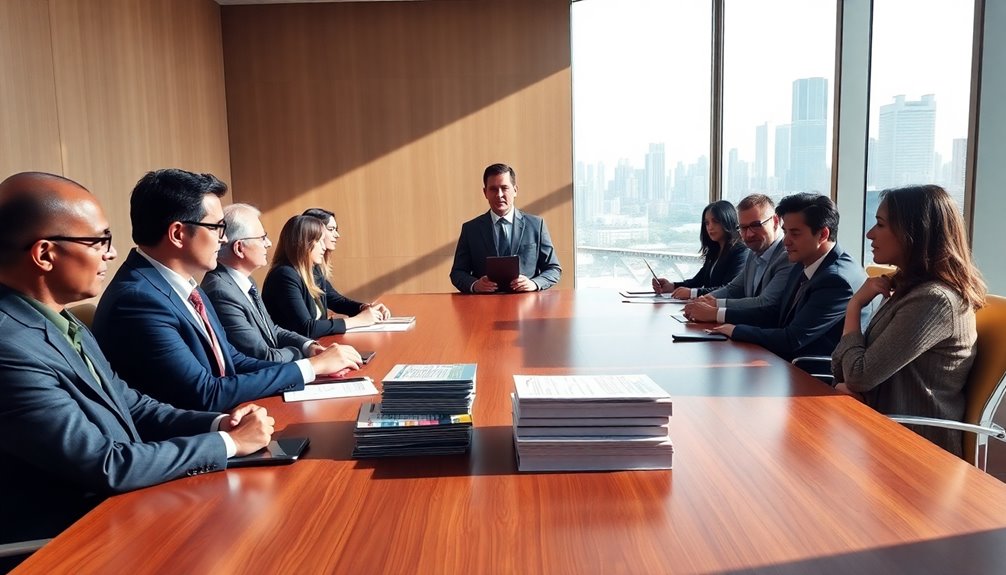Mastering panel interviews takes preparation and engagement. Start by researching each interviewer's role. Bring several copies of your resume and business cards. During the interview, address each panel member by name and maintain eye contact, which builds rapport. Be ready to answer common questions like "Tell us about yourself" using specific examples, and follow the STAR method to create structured responses. Show genuine interest in their perspectives and ask insightful questions. With these techniques, you'll not only boost your confidence but also stand out as a candidate. Keep going, and you'll uncover even more strategies for success.
Key Takeaways
- Research each panelist's role and accomplishments to establish rapport and engage meaningfully during the interview.
- Use the STAR method to structure your answers for behavioral questions, providing clear examples.
- Address each interviewer by name, maintaining eye contact to convey respect and confidence.
- Prepare insightful questions for the panel to demonstrate your interest in the role and company culture.
- Dress professionally and arrive early to reflect your commitment and professionalism.
Understanding Panel Interviews

Panel interviews can feel intimidating, but understanding their structure can give you a significant advantage.
In a panel interview, you'll sit down with two or more team members, which may include your future supervisor, HR representatives, or key decision-makers. Each panelist will ask questions about your experience, qualifications, and career goals.
These interviews are often held for convenience, enabling the hiring team to gain diverse perspectives and assess how well you collaborate. By knowing that panel interviews aim to challenge you and evaluate your teamwork skills, you can approach the situation with confidence.
Effective Preparation Strategies

Approaching a panel interview with confidence is important, but effective preparation can make all the difference. Start by researching each interviewer—understand their roles, accomplishments, and initiatives. This knowledge helps you build rapport and tailor your responses.
Bring enough copies of your resume and business cards for everyone, making a good impression from the outset. During the interview, engage with each panel member; address them by name and maintain eye contact.
Prepare specific examples of your qualifications to answer potential follow-up questions effectively. Finally, think of insightful questions to ask them, demonstrating your interest in the company and the panelists.
This preparation not only shows your enthusiasm but also helps you stand out in a competitive environment.
Common Panel Interview Questions

You'll likely encounter several common questions during a panel interview that can help the team assess your fit for the role.
Be prepared to answer questions like, "Tell us about yourself," which allows you to showcase your background and skills. You might also hear, "Why should we hire you?" so think about what makes you uniquely qualified.
Expect inquiries about teamwork, such as, "Can you discuss an instance of collaboration?" This helps them gauge your interpersonal skills.
Additionally, they'll likely invite you to ask questions, like, "Do you have any questions for us?" Use this opportunity to express your interest and engage with the panel.
Being ready for these questions will help you present yourself confidently and effectively.
Engaging With Panel Members

Establishing a connection with each panel member is essential for a successful interview. To engage effectively, address each interviewer by name and maintain eye contact. Show genuine interest in their questions and perspectives; this helps foster rapport.
Reference shared experiences or knowledge about their work to create a more conversational atmosphere. Use non-verbal cues, like nodding and smiling, to convey your engagement. When responding, face the panel as a whole, ensuring everyone feels included in the conversation.
Also, prepare thoughtful questions to ask them, demonstrating your interest in their roles and the company. This interaction not only showcases your communication skills but also emphasizes your enthusiasm for the position, making you a memorable candidate.
Key Interview Techniques

Engaging effectively with panel members sets the stage for the next step: employing key interview techniques that can elevate your performance.
Start by addressing each panelist by name, maintaining eye contact, and facing them while you speak. This shows respect and engagement.
Manage your time wisely, ensuring you provide concise yet thorough responses, especially when showcasing your problem-solving skills. Use the STAR method to structure your answers for behavioral questions, making your examples clear and impactful.
Additionally, research the company culture and values to align your responses accordingly.
Finally, dress appropriately and arrive early to convey professionalism and punctuality.
Mastering these techniques will help you stand out during your panel interview.
Insights for Hiring Managers

When conducting panel interviews, hiring managers should focus on evaluating candidates through a thorough lens.
It's crucial to assess not just their qualifications, but also their communication skills and cultural fit. Use open-ended questions to promote discussion and better understand the candidate's thought process.
Guarantee each panel member engages, encouraging diverse perspectives during the interview. Take detailed notes to aid in post-interview evaluation and decision-making.
Maintain a welcoming demeanor to help candidates feel at ease, which can lead to more authentic responses.
Finally, allow candidates time to ask questions; their inquiries can reveal their enthusiasm and interest in the role and organization. Additionally, understanding the importance of monitoring credit card statements can help candidates demonstrate their financial awareness and responsibility.
Additional Resources for Candidates

As you prepare for a panel interview, tapping into additional resources can markedly enhance your readiness. Consider reading articles like "9 Techniques to Apply for a Successful Job Interview" and "20 Things Hiring Managers Consider During an Interview." These materials provide valuable insights into what interviewers look for and how to present yourself effectively.
You might also find it helpful to watch online videos demonstrating successful panel interviews; they can offer you practical examples of engaging with multiple interviewers.
Joining forums or online groups focused on job seekers can provide peer support and shared experiences.
Finally, practicing mock interviews with friends or mentors can boost your confidence and refine your responses, ensuring you're prepared for any questions that come your way. Additionally, understanding the importance of effective communication skills can significantly improve your performance during the interview process.
Frequently Asked Questions
What Should I Wear to a Panel Interview?
When you're heading to a panel interview, you should aim for professional attire that reflects the company culture.
A tailored suit or a smart dress can work well. Choose neutral colors like navy, black, or gray, and make certain your outfit is clean and pressed.
Don't forget comfortable shoes, as you'll be on your feet. Accessories should be minimal to keep the focus on you.
Dressing appropriately shows respect and sets a positive impression.
How Long Does a Panel Interview Usually Last?
Imagine stepping into a courtroom, where your fate hangs on the deliberations of the jury.
A panel interview usually lasts between 30 to 60 minutes, depending on the number of interviewers and the complexity of questions.
It's crucial to stay engaged and concise, ensuring you showcase your skills while respecting their time.
Just like a well-crafted story, every minute counts, so be prepared to make a lasting impression in that window!
Is It Okay to Follow up After the Interview?
Yes, it's definitely okay to follow up after the interview.
Sending a thank-you email within 24-48 hours shows your appreciation and enthusiasm for the opportunity. In your message, briefly reiterate your interest in the position and mention something specific from the interview to make it personal.
This not only helps you stand out but also keeps you on their radar as they make their decision.
Can I Take Notes During the Interview?
Yes, you can take notes during the interview. It shows you're engaged and helps you remember key points later.
Just be discreet and make certain it doesn't distract you from the conversation. When you jot down important information or questions, it demonstrates your interest in the role and the company.
However, balance taking notes with maintaining eye contact and interaction with the interviewers. They'll appreciate your attentiveness and preparedness.
How Many Panel Members Typically Participate in an Interview?
"Too many cooks spoil the broth." Typically, a panel interview involves two to six members.
This range allows for diverse perspectives while keeping the process manageable. You'll likely encounter individuals from various roles, such as HR, management, or team members.
Engaging with each panelist effectively can showcase your adaptability and communication skills.
Conclusion
Mastering panel interviews isn't just a skill; it's your secret weapon in the job market battlefield! With the right preparation and strategies, you'll not only conquer the interview but leave the panel members in awe, wishing they could hire you on the spot! So, gear up, embrace your inner superstar, and transform those nerves into unstoppable confidence. Remember, this isn't just an interview; it's your chance to shine brighter than a thousand suns!









